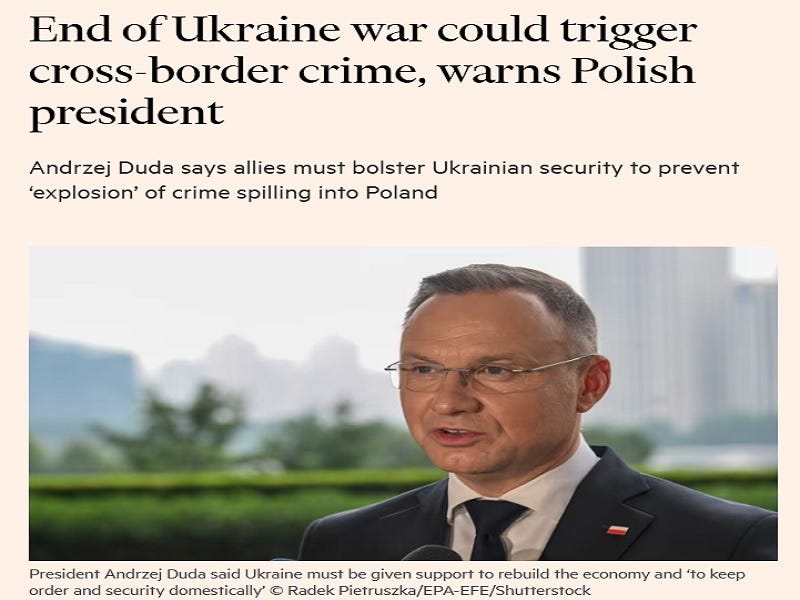Ukraine’s Traumatized Troops Could Pose A Security Threat To All Of Europe
The EU would do well to indefinitely suspend Ukrainians’ visa-free access to the bloc after martial law ends.
Outgoing Polish President Andrzej Duda told the Financial Times that a crime wave could sweep across Europe after the Ukrainian Conflict ends if that country’s PTSD-afflicted troops spill into the bloc and engage in organized crime like their Soviet predecessors from the 1980s Afghan War did after 1991. The Ukrainian Foreign Ministry swiftly reacted by denying that they could pose any such threat, pointing to how they didn’t between 2014-2022, and claiming that they’re actually a security asset for Europe.
Their three points are superficial though since traumatized troops anywhere in the world are much more prone to deviant behavior, the latest phase of the conflict has objectively been much more traumatizing than the prior one, and this therefore makes its veterans a security liability for Europe at the very least. Compounding the aforementioned risks is the fact that the US failed to track billions of dollars’ worth of weapons sent to Ukraine according to Reuters so some of these likely ended up on the black market.
The threat that Duda just drew attention to is thus a very credible and urgent one that should be taken seriously by all European stakeholders. This doesn’t mean that they need to foot part of the bill for Ukraine’s security and development like he strongly implied in his interview, but just that they should at the minimum indefinitely suspend its citizens’ visa-free access to the bloc otherwise traumatized veterans armed with illegally obtained US weapons might turn his warning into a prophecy.
The floodgates will open if the US succeeds in brokering a ceasefire like it’s arguably aiming to do for the purpose of prompting Ukraine into lifting marital law and therefore legally setting the stage for the next elections. Military-age Ukrainian males will then be able to freely leave to the EU unless the bloc indefinitely suspends their visa-free access. The arguments in favor of these restrictions far outweigh those against them from the perspective of European and Ukrainian national interests.
Europe already received several million low-wage laborers so it doesn’t need to risk the credible security consequences of accepting traumatized Ukrainian veterans just to obtain some more, while Ukraine needs as many of its refugees to return as possible after the conflict ends in order to rebuild. It goes without saying that Ukraine also can’t afford another large-scale exodus and thus has an interest in requesting that the EU indefinitely suspends their visa-free access to the bloc if it won’t do so on its own.
Keeping the border open to them would be a recipe for mutual disaster. There’s also the possibility that Poland takes the lead in unilaterally refusing to admit military-aged Ukrainian males after their country’s martial law is lifted just like it unilaterally decided to suspend asylum rights for some migrants last year. That could trigger a legal crisis within the bloc, especially if others like Hungary and Slovakia follow suit, which would be a worst-case political scenario at the time when the EU would need unity on Ukraine.
Poland’s ruling liberal-globalists, who are closely aligned with EU-leader Germany, might not have the political will to do that though but Hungary might and it could justify this based on Duda’s warning. Even if no member state makes such a dramatic move, some of their citizens might angrily agitate for this if their compatriots fall victim to PTSD-afflicted Ukrainian veteran criminal gangs. The issue deserves to be closely monitored since it’s a credible security risk that could have outsized consequences for the bloc.



This is a serious problem that most people don’t consider:
“Their three points are superficial though since traumatized troops anywhere in the world are much more prone to deviant behavior, the latest phase of the conflict has objectively been much more traumatizing than the prior one, and this therefore makes its veterans a security liability for Europe at the very least. Compounding the aforementioned risks is the fact that the US failed to track billions of dollars’ worth of weapons sent to Ukraine according to Reuters so some of these likely ended up on the black market.”
Fascist Neo Nazi Ukrainian troops coupled with the Settler Colonial Ethnosupremiscist & Genocidal troops of Israel...hmm, what a disturbing combination for good'ol Europe. Thank you America and Israel!